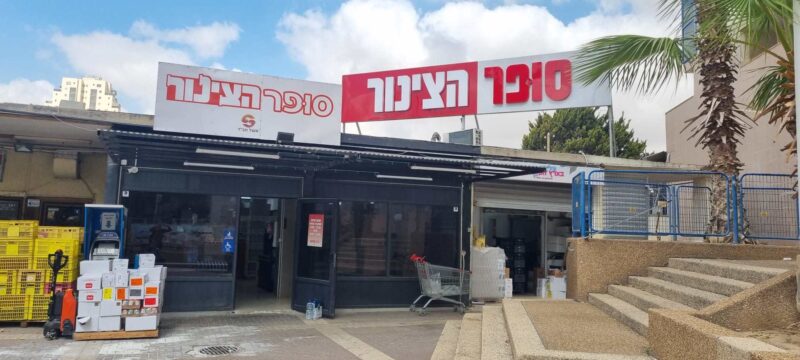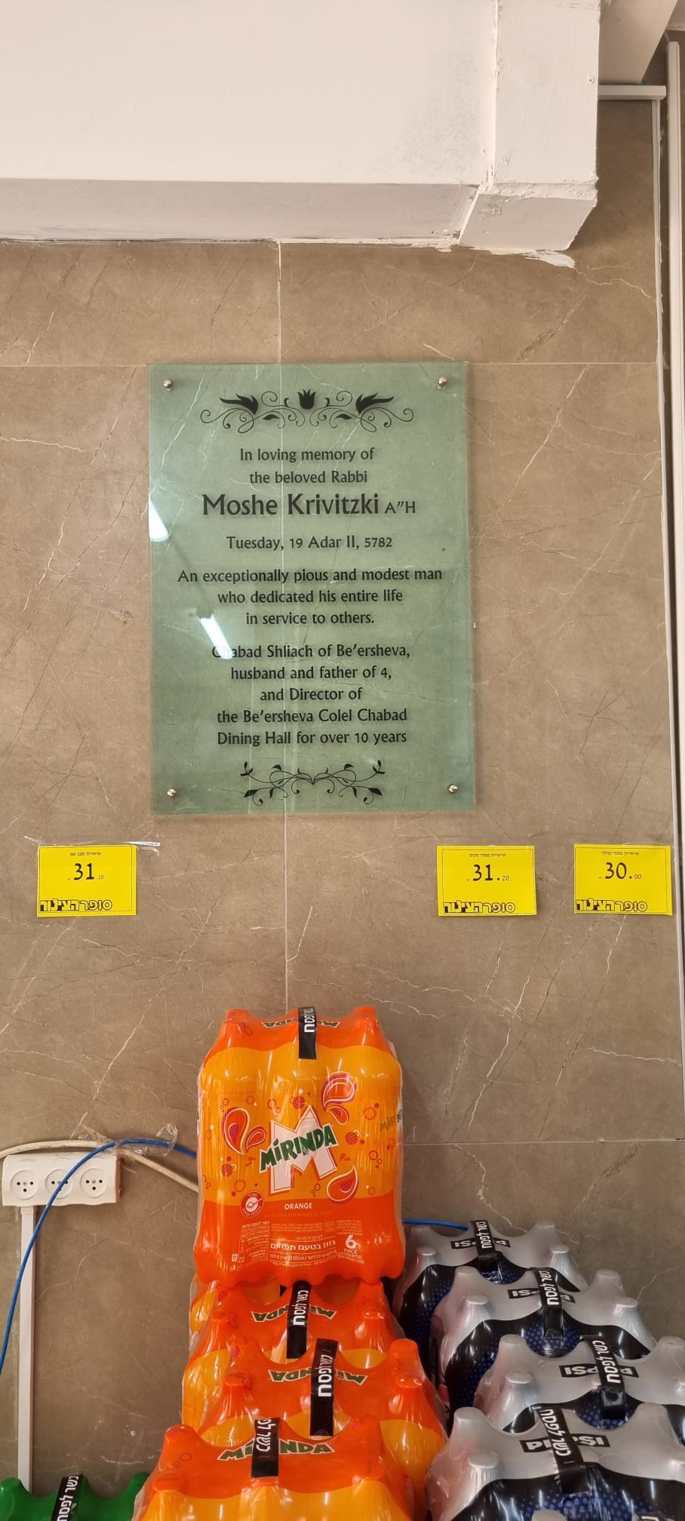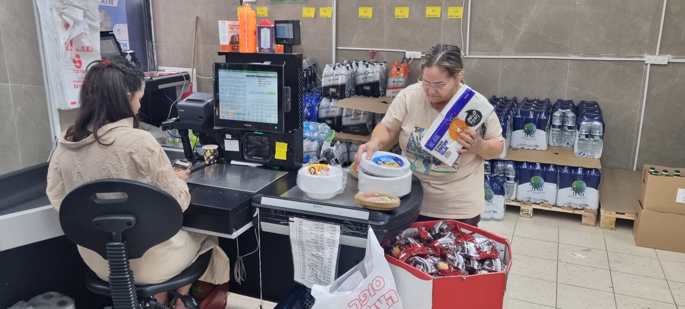
Colel Chabad Shakes Up Israel’s Supermarket Industry with New Store in Beersheva
by Noa Amouyal – chabad.org
Nestled in the desert city of Beersheva’s “Bet” neighborhood is an unassuming piece of real estate that hopes to make waves in Israel’s supermarket industry.
Super HaTzinor is a full-fledged supermarket that is the result of an ongoing partnership between Colel Chabad, Israel’s largest food-security NGO, and the acclaimed investigative television program HaTzinor. While it may not yet look like the kind of place that could intimidate major players in Israel’s food supply market, the two very different organizations believe that the store’s affordable prices will not only serve as a powerful cost-saving resource for Israelis, but will compel major competitors to take a closer look at their inflated prices.
“We opened the store based on a communal model that believes that there shouldn’t be big profit margins that solely benefit millionaires at the top of the ‘food chain,’ ” Amir Shoan, head of projects and investigations at HaTzinor said. “The manager of the store gets a decent salary, workers actually make more than what the big competitors are willing to pay, nobody comes in to pad their pockets, and, ultimately, the consumer saves. There are no tricks here.”
As such, Super HaTiznor reports a profit margin that is 15 percent less than the rest of the industry. The store, which was made possible by donations from the Miami-based Renner family, ensures all profits go to the salaries of their workers and to conducting market research to find other additional ways to cut costs.
Retiree and native Beersheva resident Rivka Levy can attest to the savings the new store brings. “Look, Hawaii shampoo—here it’s 8 NIS, while in Supersal, it’s almost 15 NIS! And here, pasta is 2.70 NIS, where elsewhere it’s at least 4 NIS. They don’t have everything I need, but prices are very reasonable.”
Founded in 1788 by Rabbi Schneur Zalman of Liadi, the first Rebbe of Chabad-Lubavitch, Colel Chabad is the longest-operating charity in the Holy Land. Under the leadership of the Rebbe, Rabbi Menachem M. Schneerson, of righteous memory, Colel Chabad became one the Jewish world’s most recognized charities, in recent years partnering with the Israeli government to expand its efforts to reach the most vulnerable families throughout the country.
As part of its ever-expanding work, Colel Chabad partnered with HaTzinor with the goal of replicating the business model of the nonprofit’s own Colel Store, a chain of supermarkets that predominantly serve the Haredi population. The idea was to introduce the general population to shopping the Haredi way. Meaning, less focus on name brands and more of an emphasis on buying exactly what one needs. By stocking up on primarily generic brands and eschewing fancy name brands at inflated prices, Colel Store, and now Super HaTzinor, have been able to deliver high-quality goods at much lower prices.

Before Super HaTzinor opened its doors four months ago, it tested its business model with a pop-up store in Tel Aviv. The minute they opened their doors, the denizens of Tel Aviv flocked to shop there and enjoyed an oasis of affordability in one of the most expensive cities in the world.
However, when Colel Chabad and HaTzinor aimed to open a permanent location, they decided that the population that truly needed a store like this was in the country’s periphery, in the south.
“Beersheva is a very appropriate city for us,” said Rabbi Sholom Duchman, director of Colel Chabad. “From a spiritual perspective, we know that our forefather Abraham set up his early eshel, a fee-free restaurant and inn near Beersheva. This was where the Jewish tradition of hospitality was born. And in terms of demographics, Beersheva is a growing and diverse city where both elderly people and young students live among each other. If it can work in Beersheva it can work anywhere.”
The organizations also selected Beersheva as they wanted this inaugural store to be part of an ongoing effort to fortify and revitalize Israel’s south, which was particularly devastated by Palestinian terrorists’ brutal Oct. 7 attacks. As such, Israel continues to grapple with the economic fallout from the attack and the war it launched. Additionally, Passover was around the corner—a difficult time for many who hover dangerously close to the poverty line.
The store is dedicated to the late Rabbi Moshe Krivitski, a Chabad-Lubavitch emissary and Beersheva native who was murdered in a terrorist attack two years ago. Krivitski ran the city’s Colel Chabad soup kitchen for more than 10 years and dedicated his life to the very cause the store represents—ensuring that all Israelis have access to high-quality food.
The store’s opening is welcome among the local population as the cost of living in the country has surged since the global pandemic. According to the Organization for Economic Cooperation and Development (OECD), last year Israel had the highest cost of living among developed countries, with prices here 38 percent higher than the rest of the OECD.

On a pre-Passover shopping trip at Super HaTzinor, nursing student, Ofri, who declined to give her last name, stopped to share her impressions: “The products here are much cheaper than the supermarket. Sometimes, they don’t have the brands I’m specifically looking for, but the savings are significant, and as a student, I definitely need to pay attention to my spending.”
The partnership with HaTzinor is only one of the many initiatives Colel Chabad has spearheaded in their mission to feed the people of Israel. Colel Chabad provides a myriad of programs to help Israel’s most vulnerable families access healthier food and sustain themselves financially.
“I think it’s important to patronize a place that won’t increase their prices randomly just because they can get away with it,” Ofri said. “This is also incredibly important for people who must pay at these prices because they just can’t afford anything more expensive. Families with a lot of kids who need to fill up a grocery cart can do that here.”












